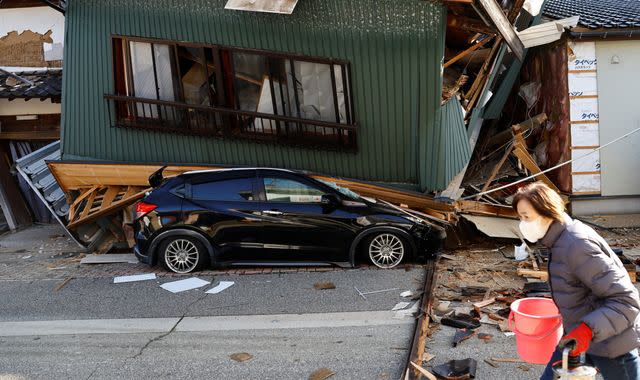Japan earthquake death toll rises as PM warns of 'battle against time' to rescue survivors

The number of people killed after a 7.6-magnitude earthquake hit Japan has risen to at least 48.
A series of quakes struck Ishikawa prefecture on Monday afternoon, triggering a now-cancelled tsunami alert that caused some to flee to higher ground.
Buildings collapsed, cracks opened in roads and fires broke out - with Japan's prime minister saying it is now a race to help survivors.
Another earthquake hits Japan - get live updates
On Tuesday morning (UK time) another earthquake struck Japan's Ishikawa region.
"Saving lives is our priority and we are fighting a battle against time. It is critical that people trapped in homes get rescued immediately," said Fumio Kishida.
Around 120 people may could still be awaiting rescue, his office said.
He said there was "large-scale damage" and that it's especially hard to reach the northern tip of Ishikawa's Noto peninsula, due to damaged roads.
Japanese media reports have reported tens of thousands of homes destroyed.
A thousand soldiers have been deployed to the quake area - on Japan's west coast - alongside police and firefighters, Mr Kishida added.
Officials confirmed on Tuesday that 30 people had died just in the city of Wajima, near the epicentre, where smoke and embers were still filling the sky on Tuesday.
Many rail services, ferries and flights into the area have also been suspended.
Noto airport has shut due to damage to the runway, terminal and access roads, with 500 people stranded inside cars in its car park.
More than 140 tremors have been recorded since the quake first hit, according to Japan's meteorological agency - which has warned more strong shocks could follow.
On Monday night, around 100,000 people were also evacuated from the quake zone and spent the night in school halls and gyms.
Japanese people are well-drilled on what to do in an earthquake and most of the country's modern buildings are built with some kind of quake resistance.
Read more:
South Korean opposition leader 'stabbed in neck'
Israel's Supreme Court strikes down controversial law
A 2011 quake and tsunami in Japan led to the Fukushima nuclear accident - the second-worst in history.
However, the country's nuclear authority said no problems had been detected so far.
President Biden and UK Prime Minister Rishi Sunak are among those who have offered Japan help if needed.
My Biden said the countries shared a "deep bond of friendship", adding: "Our thoughts are with the Japanese people during this difficult time."
Rishi Sunak called Japan's prime minister a "great friend of the UK" and said Britain was "ready to support Japan".


